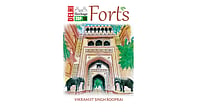From the word go it shouts Marquez—and, naturally, if Marquez is there, can Rushdie be far behind? Beauty is a Wound evokes the well-trodden world of magical realism from the very first sentence. People jump off mountains and vanish in the sky, ghosts haunt the village. Dead pigs transmute, perhaps karmically, into human beings. The book is an account of love, lust, fantasy and violence.
Beauty is a Wound tells the story of Dewi Ayu, who is half-Dutch and who became a prostitute during the time of the Japanese occupation. Dewi’s life and death covers various generations and peculiarities. Kurniawan’s place of choice is Halimunda, a small island that would have fallen off the map except for its Japanese spy population. Halimunda is Indonesian history in miniature: the Dutch occupation, the native population, the Japanese invasion and clashes with Communists and communities. It is Kurniawan’s Macondo and, like 100 Years, is a multi-generational novel peopled with ghosts and legends.
Rushdie and Midnight’s Children take over from Marquez as politics encroaches upon the story. Halimunda acts as Indonesia in miniature for Kurniawan, a place where he can show the effect of history on his country and throw in his own effects. Comrade Kliwon’s story, for example, takes temporary detour from the magic and settles down to political realism for a while. Sometimes even the supernatural can have a historic link—the pigs shot in Indonesia had actually become maneaters during the war owing to a superfluity of dead human flesh and the smaller villages were overrun by rabid dogs.
Eka Kurniawan’s hefty portmanteau novel has only very recently brought its bizarre sleight of hand to English readers and, through Dewi Ayu’s life and death, takes its audience on a roller-coaster ride of Indonesian history, through a path of love, lust and incest. Halimunda is a place where beauty is a curse and the lack of it possibly a blessing, since the ‘Beauty’ of the title looks like a cross between a frog and a pig. In this topsy-turvy world, true beauty does its owner no favours. Dewi Ayu is frequently pregnant, a side-effect of her sex work, and the book is criss-crossed with frequent rapes, which flow equally from history and fiction.
Then, there are the military battles and gender conflicts. Dewi’s fault is that she is beautiful, confident and abandoned to the turmoil of her Dutch and Indonesian blood and cursed by family incest, a curse that touches her three beautiful daughters and the not-so- beautiful one named Beauty. Each of the women has the power to drive men insane, a gift which makes their beauty infamous; some do refuse to marry, while some die tragic deaths in the cause of love. Relationships between men and women too are strange, with the prostitute as mother-in-law and with divisions of the social and the private. Despite it all, Dewi Ayu triumphs as the matriarch whom even death cannot keep down—though whether her return gives her happiness is to be debated.
As magical realism frequently does, the story drifts in and out of folk-tale land through its 18 chapters and numerous characters. However, by the time the story of the ugly Beauty is reached, it does seem as though Kurniawan finally ran out of breath and babies, not to mention cousinly confusion and entanglings, though his message that beauty is a curse runs clear.
Annie Tucker’s translation makes the narrative seem as if it were actually written in English because of its wit and style. As a revival of the magical realism form, it promises a return to a Macondo set in Indonesia.


























